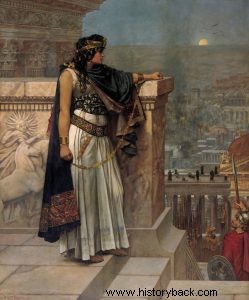
Zenobia (from Zeus and Bios) is a highly enigmatic personality of late antiquity. He was born in 240 AD. She herself claimed to be a descendant of Cleopatra of Egypt and therefore had roots from the Ptolemies. This information is also mentioned in "Augusta History". He was fluent in Greek, Aramaic and Latin. She married the lord of Palmyra Odainathos. Palmyra was under Roman rule.
But in 260 AD the emperor Valerian was defeated by the Parthians and captured. The Parthians poured out unrestrained to plunder the Roman provinces but Odainatus he managed to defeat them. In return, Rome declared him a vassal king of Palmyra.
Odenathos remained a vassal of Rome. But in 267 AD he and his son from his first marriage and successor Herodianus were murdered. Thus the throne of Palmyra was left vacant and Zenobia assumed power. Rumors of the time stated that the queen was involved in the murder of her husband.
The war with Rome
Zenobia, an independent spirit, could not accept servitude to Rome. After consolidating her authority in the city and taking the army with her, she decided to move. Her army, under general Zavdas, invaded Petraea Arabia. He defeated the Romans and conquered the region.
He then invaded the Jordan Valley and then Egypt which he annexed depriving Rome of a rich province. He then occupied a significant part of eastern Asia Minor, reaching Mesopotamia in the east and Sudan in the south.
Rome could not help but react and the new emperor Aurelian s prepared a great campaign against Zenobia. The army of Palmyra was strong. The source of its power was its famous barricaded heavy horsemen who, themselves and their horses, were armored from head to toe , they formed themselves in a dense order and charged like a moving wall, pointing their long spears at her.
He also had good light cavalry whose men carried a bow, a small spear/javelin and a small shield. It had not a large number of regular divisions of archers and irregular divisions of light infantry. Where he fell short was heavy infantry which he had none of. To deal with the formidable barricades, Aurelian ordered his lighter and more agile cavalry not to fight them head-on, but to constantly maneuver .
Roman counterattack
The Romans launched their counterattack against Zenobia from Asia Minor as well as Africa. While Aurelian was recapturing Asia Minor, a smaller force was recapturing Egypt. In Asia Minor the Romans reached Antioch undisturbed. There was the first battle with Zenobia's army, near the city.
The Roman cavalry, constantly maneuvering, strained and finally defeated Zenobia's shutters , forcing the army of Palmyra to retreat. However, Zenobia was not yet defeated. In Emesa, today's Homs in Syria, the two armies met again.
Both extended about 70,000 men. This time Zenobia's barricades charged against the Roman cavalry supported by the friendly light cavalry and crushed them . At the same time, however, the Roman legionnaires were cutting down the archers of Palmyra. The victorious until then famous cavalry of Palmyra was flanked, surrounded and dispersed.
The remnants of the army fled to Palmyra where they were besieged. Aurelian immediately besieged the city. When Zenobia saw that further resistance was futile, she tried to flee to the Parthians but was captured by the Romans. The state of Palmyra was overthrown.
Regarding the fate of Zenobia, the sources do not agree. Others state that she died a prisoner of the Romans refusing to receive food, others that she was taken to Rome and after Aurelian's triumph she was beheaded, and others that Aurelian settled her in Rome, granting her a mansion and marrying a Roman nobleman.
However, her death is placed around 275 AD. That is, Zenobia died at the age of only 35, a fact that is not consistent with the last view. The enigmatic queen of the East with, perhaps, Greek blood in her veins, still keeps her secrets hidden.

The state of Palmyra at the height of its expansion.

Zenobia a prisoner of the Romans.

Queen Zenobia in Palmyra.
